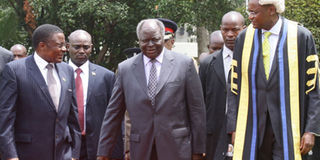Sudan nations must not return to war, says Kibaki

President Kibaki (centre), East Africa Legislative Assembly (EALA) speaker Abdirahim Abdi (right) and Kenya National Assembly Speaker Kenneth Marende (left) after the President addressed the EALA assembly at Parliament buildings April 17, 2012. BILLY MUTAI
President Kibaki has urged East African Community (EAC) member states to find ways of addressing the conflict between South Sudan and Sudan.
He said the EAC should not allow the two nations to return to war so soon after a peaceful referendum on independence for the South.
President Kibaki urged the Presidents of Sudan, Omar al-Bashir and Salva Kiir Mayardit of South Sudan to work closely to resolve the emerging disputes so as not to reverse the gains so far realised after the successful implementation of the Comprehensive Peace Agreement.
The President made the remarks Tuesday while addressing a special sitting of the East African Legislative Assembly at Parliament buildings, Nairobi.
On the Somali conflict, the Head of State noted that Somalia is presently going through a defining moment and that the country had a great opportunity to move ahead after 20 years of internal strife.
During the occasion, he lauded Uganda, Burundi and Kenya for their contribution towards peace and stability in Somalia and the sacrifices made by their military under Amisom command.
President Kibaki was categorical that stability in the region would enable the neighbouring states implement many ambitious cross-border projects that are in the planning stage.
He told the East African Assembly legislators that huge investments were required to interconnect the region through railways, roads, fibre-optic cable and oil pipelines among vital linkages.
With regard to integration process, President Kibaki called on the East African Community members to eliminate non-tariff barriers which continue to hamper the realisation of full benefits of free movement of goods and factors of production in the region.
He said under the Customs Union and Common Market every EAC member must ensure the removal of these barriers which act as a bottleneck to regional integration.
"The establishment of the Customs Union in 2005 and Common Market in 2010 fulfilled our dream of economically integrating our region," said President Kibaki.
Welcoming the EAC legislators in Kenya, he said that the Assembly played a key role in the integration process particularly through numerous public hearings of bills.
"The Second East African Legislative Assembly whose five year term is coming to end has debated and passed a total of 35 pieces of legislation, three times more than the First Assembly.
“This is highly commendable. The Honourable members showed great commitment and hard work during your tenure," said the President.
The two-week EALA plenary is the Fourth Meeting of the Fifth Session of the Second Assembly.
Kenya’s Speaker Kenneth Marende on his part assured EALA of support necessary for execution of their mandate in passing of legislation and the EAC integration process.




